Cite this document
(The Identity of 'Britishness' amongst Northern British Asians Literature review, n.d.)
The Identity of 'Britishness' amongst Northern British Asians Literature review. https://studentshare.org/culture/1710297-literature-review-the-identity-of-britishness-amongst-northern-british-asians
The Identity of 'Britishness' amongst Northern British Asians Literature review. https://studentshare.org/culture/1710297-literature-review-the-identity-of-britishness-amongst-northern-british-asians
(The Identity of 'Britishness' Amongst Northern British Asians Literature Review)
The Identity of 'Britishness' Amongst Northern British Asians Literature Review. https://studentshare.org/culture/1710297-literature-review-the-identity-of-britishness-amongst-northern-british-asians.
The Identity of 'Britishness' Amongst Northern British Asians Literature Review. https://studentshare.org/culture/1710297-literature-review-the-identity-of-britishness-amongst-northern-british-asians.
“The Identity of 'Britishness' Amongst Northern British Asians Literature Review”. https://studentshare.org/culture/1710297-literature-review-the-identity-of-britishness-amongst-northern-british-asians.


